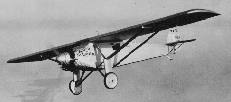Flying Blind | by Jay
 When Charles Lindbergh flew the Spirit of St. Louis, he left his radio behind. "When the weather is bad you can't make contact with the ground," Lindbergh said. "When the weather isn't bad a pilot doesn't need a radio." In fact, Lindbergh couldn't even see forward out of the plane -- there was no front window, and he only had a small periscope to peer out the side. To navigate, he used the stars and a small compass, and fighting through the fog and ice and his own fatigue, there were times over the Atlantic he had no idea how far he was to Paris, or where exactly he was. Lindbergh related later how he got some unlikely help:
When Charles Lindbergh flew the Spirit of St. Louis, he left his radio behind. "When the weather is bad you can't make contact with the ground," Lindbergh said. "When the weather isn't bad a pilot doesn't need a radio." In fact, Lindbergh couldn't even see forward out of the plane -- there was no front window, and he only had a small periscope to peer out the side. To navigate, he used the stars and a small compass, and fighting through the fog and ice and his own fatigue, there were times over the Atlantic he had no idea how far he was to Paris, or where exactly he was. Lindbergh related later how he got some unlikely help:
The first indication of my approach to the European Coast was a small fishing boat which I first noticed a few miles ahead and slightly to the south of my course. There were several of these fishing boats grouped within a few miles of each other.Eventually he got back on track, and 33 hours after taking off from Roosevelt Field in New Jersey he touched down to a perfect landing at Paris' LeBourget airport to a cheering crowd of 150,000.
I flew over the first boat without seeing any signs of life. As I circled over the second, however, a man's face appeared, looking out of the cabin window.
I have carried on short conversations with people on the ground by flying low with throttled engine, and shouting a question, and receiving the answer by some signal. When I saw this fisherman I decided to try to get him to point towards land. I had no sooner made the decision than the futility of the effort became apparent. In all likelihood he could not speak English, and even if he could he would undoubtedly be far too astounded to answer. However, I circled again and closing the throttle as the plane passed within a few feet of the boat I shouted, "Which way is Ireland?" Of course the attempt was useless, and I continued on my course.
This morning I felt a bit like Lindbergh, flying blind with only a couple of instruments to gauge our progress, putting my faith in the experimental contraption known as the Search Committee, and looking to the stars. There were signs that land was near:
University spokesman Matt Storin, when reached via cell phone Friday night, responded as follows: "While there was debate in the decision not to retain coach Willingham, I can tell you that the university administration is strongly united in the search for a new coach. And we're nearing the conclusion of that process."And yet there was some indication that we were still out over the water. As the media opinion was coalescing the last couple of days towards Shanahan (fading), Weis (holding steady), and Clements (gaining), yesterday we found out Redskins defensive coordinator Greg Blache (and former Irish defensive back) had been contacted for the job earlier in the week. In fact:
Redskins officials believed Friday night that Blache, 55, had such an excellent shot at the job that they had begun contemplating scenarios if and when he left Joe Gibbs' staff, a league source said.Another name to surface was ex-Browns coach Butch Davis, who was on everybody's talking points from the very beginning, but didn't make the 'official interest' ledger until late last night.
Now, If we're still proposing names and conducting interviews, it would seem that we're still in the middle of a much longer process. It doesn't make sense to be bringing up new names unless we're still canvassing. But the Chicago Tribune (according to sources) says that we're in fact much closer than that: "A source with knowledge of the search said White and Jenkins would like to choose a candidate to present to the decision-making body of seven that is expected to meet Saturday in South Bend." That's today.
If the Trib is right, and as of today, White and Jenkins really do have it down to one candidate, then we're going to see something very soon. Unofficial sources (okay; the emails from "connected" friends choking my inbox) say that we're close, too. Yet at this point all we've got is hearsay and conjecture (note the Trib article byline, for instance), and we very well could be waiting for another week or two.
Which is fine by me. I can wait (I think). But more importantly, when we land, whether it's Monday or a few weeks from now, let's hope our staff was as good as Lucky Lindy, and we're about to touch down in Paris, to the cheering thousands, right on target. For the last few searches, we've been doing this a little too often; this time, let's get it right.
